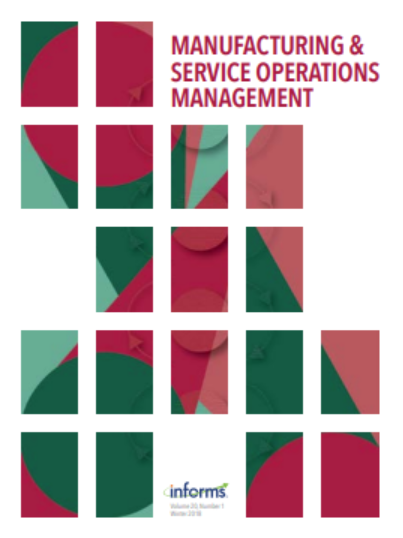座位分配:高速列车售票的动态容量控制
IF 4.8
3区 管理学
Q1 MANAGEMENT
M&som-Manufacturing & Service Operations Management
Pub Date : 2023-05-01
DOI:10.1287/msom.2023.1188
引用次数: 0
摘要
问题定义:我们考虑一个来自中国高铁车票销售的收入管理问题。与传统的网络收益管理问题相比,我们的问题的新特点是席位分配限制。也就是说,每个请求,如果被接受,必须在整个旅程中立即分配到一个座位,并且不允许稍后进行调整。在做出决定时,卖方不仅需要跟踪可用的总座位容量,还需要跟踪每个座位的状态。方法/结果:针对这个问题,我们建立了一个改进的网络收益管理模型。首先,我们研究了一个静态问题,其中所有的请求都是给定的。虽然问题一般来说是np困难的,但我们确定了多项式时间内可解的条件,并提出了一般情况下有效的近似算法。然后,我们引入了一种新的基于最大序列原理的投标价格控制策略。该政策适应了投标价格的非线性,因此,比传统的投标价格控制政策更准确地近似于价值函数。最后,我们将最大序列的动态视图与原始问题的静态解相结合,提出了在温和假设下可以实现一致有界收入损失的“重新求解动态原始”策略。利用合成数据和实际数据进行的数值实验证明了我们提出的策略在资源配置效率方面的优势。管理启示:本研究的结果揭示了我们的问题与传统网络收益管理问题之间的联系。特别地,我们证明了通过自适应地使用我们提出的方法,分配座位限制的影响在理论和实践中都是有限的。基金资助:刘s . Liu的研究部分得到国家自然科学基金资助[Grant NSFC-72072117]。王忠的研究得到了国家自然科学基金委的部分资助[Grant NSFC-72150002]。补充材料:在线附录可在https://doi.org/10.1287/msom.2023.1188上获得。本文章由计算机程序翻译,如有差异,请以英文原文为准。
Assign-to-Seat: Dynamic Capacity Control for Selling High-Speed Train Tickets
Problem definition: We consider a revenue management problem that arises from the selling of high-speed train tickets in China. Compared with traditional network revenue management problems, the new feature of our problem is the assign-to-seat restriction. That is, each request, if accepted, must be assigned instantly to a single seat throughout the whole journey, and later adjustment is not allowed. When making decisions, the seller needs to track not only the total seat capacity available, but also the status of each seat. Methodology/results: We build a modified network revenue management model for this problem. First, we study a static problem in which all requests are given. Although the problem is NP-hard in general, we identify conditions for solvability in polynomial time and propose efficient approximation algorithms for general cases. We then introduce a bid-price control policy based on a novel maximal sequence principle. This policy accommodates nonlinearity in bid prices and, as a result, yields a more accurate approximation of the value function than a traditional bid-price control policy does. Finally, we combine a dynamic view of the maximal sequence with the static solution of a primal problem to propose a “re-solving a dynamic primal” policy that can achieve uniformly bounded revenue loss under mild assumptions. Numerical experiments using both synthetic and real data document the advantage of our proposed policies on resource-allocation efficiency. Managerial implications: The results of this study reveal connections between our problem and traditional network revenue management problems. Particularly, we demonstrate that by adaptively using our proposed methods, the impact of the assign-to-seat restriction becomes limited both in theory and practice. Funding: S. Liu’s research is partly supported by the National Natural Science Foundation of China (NSFC) [Grant NSFC-72072117]. Z. Wang’s research is partly supported by the NSFC [Grant NSFC-72150002]. Supplemental Material: The online appendix is available at https://doi.org/10.1287/msom.2023.1188 .
求助全文
通过发布文献求助,成功后即可免费获取论文全文。
去求助
来源期刊

M&som-Manufacturing & Service Operations Management
管理科学-运筹学与管理科学
CiteScore
9.30
自引率
12.70%
发文量
184
审稿时长
12 months
期刊介绍:
M&SOM is the INFORMS journal for operations management. The purpose of the journal is to publish high-impact manuscripts that report relevant research on important problems in operations management (OM). The field of OM is the study of the innovative or traditional processes for the design, procurement, production, delivery, and recovery of goods and services. OM research entails the control, planning, design, and improvement of these processes. This research can be prescriptive, descriptive, or predictive; however, the intent of the research is ultimately to develop some form of enduring knowledge that can lead to more efficient or effective processes for the creation and delivery of goods and services.
M&SOM encourages a variety of methodological approaches to OM research; papers may be theoretical or empirical, analytical or computational, and may be based on a range of established research disciplines. M&SOM encourages contributions in OM across the full spectrum of decision making: strategic, tactical, and operational. Furthermore, the journal supports research that examines pertinent issues at the interfaces between OM and other functional areas.
 求助内容:
求助内容: 应助结果提醒方式:
应助结果提醒方式:


